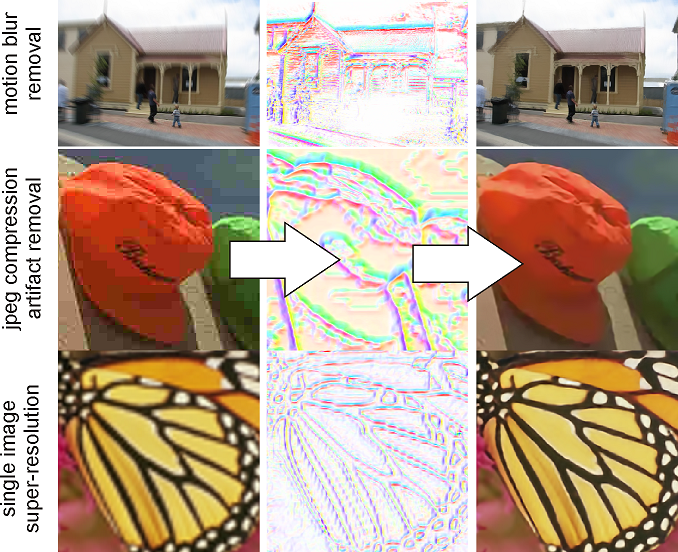Image Reconstruction with Predictive Filter Flow
Last update: Nov. 28, 2018.
We propose a simple, interpretable framework for solving a wide range of image reconstruction problems such as denoising and deconvolution. Given a corrupted input image, the model synthesizes a spatially varying linear filter which, when applied to the input image, reconstructs the desired output. The model parameters are learned using supervised or self-supervised training. We test this model on three tasks: non-uniform motion blur removal, lossy-compression artifact reduction and single image super resolution. We demonstrate that our model substantially outperforms state-of-the-art methods on all these tasks and is significantly faster than optimization-based approaches to deconvolution. Unlike models that directly predict output pixel values, the predicted filter flow is controllable and interpretable, which we demonstrate by visualizing the space of predicted filters for different tasks.keywords: inverse problem, spatially-variant blind deconvolution, low-level vision, non-uniform motion blur removal, compression artifact removal, single image super-resolution, filter flow, interpretable model, per-pixel twist, self-supervised learning, image distribution learning.
-
S. Kong, C. Fowlkes, "Image Reconstruction with Predictive Filter Flow", arXiv:1811.11482, 2018.
[project page] [high-res paper (44MB)] [github] [demo] [models] [slides] [poster]
![[lng_lat_ecef]](http://www.ics.uci.edu/~skong2/image2/pff_demo_motion_deblur.png)
![[lng_lat_ecef]](http://www.ics.uci.edu/~skong2/image2/pff_demo_jpeg.png)
![[lng_lat_ecef]](http://www.ics.uci.edu/~skong2/image2/pff_demo_SISR.png)
![[lng_lat_ecef]](http://www.ics.uci.edu/~skong2/image2/pff_demo_analysisFF.png)
